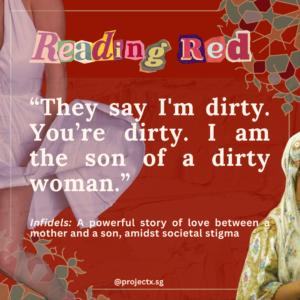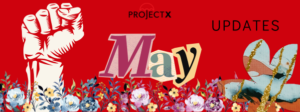At the tender age of 12, Julie began realising that she was not comfortable dressed like a male. Describing the feeling as “irritating”, Julie laments of the days where she was forced by her family to wear male clothing and carry male apparels. “Maybe they didn’t understand people like me, that’s why they forced me to become a man,” Julie shares as she recounts her childhood. Once, she was caught by her mother when she was shopping for clothes in the town area.
“It’s like you are stuck in a plastic bag. You try to open it, but you can’t. It’s just stuck” ~ Julie on how it feels like being stuck in the wrong body.
By the time she was 13, she was wearing make-up and relishing the comfort that she derived from dressing as a woman, she began her journey of transition.

Making the First Steps
Julie cites her friends as her pillars of support when she began her journey. “They taught me how to get hormones, how to do my make-up, get my hair done, and so on.” “At 12, I realised that I was trapped in the wrong body”
However, it was not long before Julie found herself having to face one of the biggest obstacles that most members of the LGBT (Lesbian, Gay, Bisexual, Transsexual) community struggle with: she wanted to come out to her family members. Julie recounts the moment: “I dressed as a woman, and then I just came back home, just like that.” It was the day of Hari Raya.
“I told them that I cannot lie to myself. This is who I want to be” ~ Julie recalls the moments that she first came out to her family.
Unfortunately for Julie, that decision marked the beginning of her descend into dark times, as she soon found herself thrown out of her own home. She was only 14.
Stop! The red light is flashing!
Along with three other friends, Julie decided to rent an apartment after she was cast out by her family. But, despite having a roof over her head, Julie knew that that was not the end of her problems. She needed money. “We all had to support ourselves. We all had to find our own money in order for us to pay the bills and everything,” recalled Julie. Having her only source of financial support taken away from her along with her home, Julie had no choice but to find a way to support herself.
And that was how Julie, as a then 15 year old, soon found herself working the streets of the red-light district as a sex worker.
There, life was by no means easy. “Very difficult,” says Julie, “you have to go through the gangsters over there, and the competition there was very big”
Thankfully, life was not all that cruel to Julie. When she first began the foray along with her friend, the two young ladies met an older gender who took them under her wing. “She took us back to her home. She will cook for us, give us money, buy us make-up. Only when you can stand on your own, then she will let you go.”
But, for every angel that rests upon your shoulders, there is always a devil. And in the case of Julie, there were many of them. Although it was not a normal occurrence, younger transgender women such as Julie faced threats and bullying from the older generation of transgender women working the streets. As Julie describes, “they will tend to bully the young ones, the younger generation, extort them by asking for money, buy cigarettes, beers.” According to Julie, extortion amounts range from $20 – $50, and violence ensues if the demands of the old-timers were not met.
“If you don’t give the amount that they want, or what they want, they will beat you up”
“If you call the police, you ask for help, you die” ~ Julie, on the bullying that younger transgenders face from their older counterparts.
When such things happened, there was not much that the victims could do. According to Julie, calling the police and apprehending the perpetrator only invited more trouble, “when the other transsexuals find out that you’re the one who called police, my friend got arrested because of you, I’m dead. They’ll….they’ll beat me up!”
Due to the relatively small population of transgender sex workers and the boundaries of they territories that they operated within, as well as the need to continue their operations and make a living, victims of such violence often found themselves either having to rely on themselves , or just put up with the wrong done to them. As Julie puts it, “it’s either they beat you up, you just shut up; or you give what they want, just shut up; or run. Run and never come back. Because if you come back and they see you, they will beat you up.”
However, violence was not the only dark cloud that loomed over Julie’s world. 2 of her flatmates were soon arrested for various crimes, forcing Julie to move into a hotel as she and the remaining flatmate were not able to keep up with rental payments.
Furthermore, Julie also soon found herself spiralling into a world of drugs.
Living like a “zombie”
That was how Julie described a lot of her days when she was working the streets. The reasons: Methamphetamine and Nitrazepam, the former better known as Ice.
As Julie puts it, “when I was doing the drug, I become very violent, I think negative about people, I don’t sleep, I don’t eat, I become very skinny. Even people could know that I was a drug addict at that point of time.”
(End of Part 1. Stay tuned for Part 2…)
—
Guest article by Jarren Lye. Jarren is currently in his third year at the National University of Singapore, majoring in Linguistics and Social Work. He is interested in social issues in Singapore, particularly those revolving around the LGBTQ+ community. He hopes to be able to utilise his writing skills as a platform raise awareness about the community and allow the voices of the marginalised to be heard. Jarren can be contacted at [email protected]





